
February 16, 2026


| “We owe it to parents to help them discern between products that will really help their children learn and those that may in fact have the opposite effect.” — Sen. Hillary Rodham Clinton |
Entitled “A Teacher in the Living Room? Educational Media for Babies, Toddlers and Preschoolers,” the report looks at marketing and advertising claims associated with such electronic media as DVDs, videos, computer software and video game systems. Although some products claim to stimulate cognitive development, improve brain capacity or teach skills ranging from phonics to geography, the report concludes that there are no published research studies to validate these benefits.
“There is research that suggests there may even be a video deficit — in other words, children learn less well with video demonstrations than with real-life interaction,” stated Victoria Rideout, a vice president at the Kaiser Family Foundation. Rideout added that some experts suggest that media exposure for children younger than 2 may actually have an adverse effect on language, attention and cognitive development, since media time can displace human interaction and other forms of learning.
The report has caught the attention of Sen. Hillary Rodham Clinton, who is calling for Senate hearings to explore the marketing and advertising claims of these products. “We owe it to parents to help them discern between products that will really help their children learn and those that may in fact have the opposite effect,” she said in a statement released by her office.
Indicative of the priority she is placing on this issue, Sen. Clinton wrote to Senator Enzi, Chair of the Senate Committee on Health, Education, Labor and Pensions, and asked that hearings be held in early 2006.
The Kaiser Family Foundation hosted a roundtable discussion in Washington, D.C., to coincide with the report’s release in December. The roundtable panel included several child health and development experts as well as representatives from such companies as VTech Electronics, Brainy Baby Company (ToyShow), Sesame Workshop and LeapFrog.
Brainy Baby’s representative on the panel was senior producer Marcia Grimsley. Brainy Baby markets its DVDs and videos as having a positive effect on cognitive development. Two of its most popular titles are “Left Brain” and “Right Brain,” targeted to children ages 9 to 24 months.
How does Grimsley reconcile this with the view that any screen time for children younger than 2 is inappropriate? “Obviously we have a difference of opinion,” she stated, “but in over a decade, we have only received positive comments from parents, educators and parenting organizations.”
Grimsley noted that Brainy Baby DVDs and videos come with Parent Guides and are designed for parents and children to watch together. “Our products are not designed to be babysitters,” she said, adding that considerable research goes into development of the products. “We micro-analyze everything to make sure the content is appropriate.”
Although acknowledging that no research exists on Brainy Baby’s products, Grimsley pointed to the overwhelmingly positive testimonials from parents. “We’re not making absurd promises or claiming an increase in a child’s IQ, but we do receive thousands of testimonials from parents saying, ‘Our children are learning.’ Brainy Baby is providing a product that offers learning opportunities.”
Rideout did not discount the importance of parental comments. “Parents obviously are very good judges of what works for their children,” she said. “However, we think that broad-based scientific evidence is also important. Without that type of research, parents don’t know whether their child could be doing better without the DVD.”
Another roundtable participant was Gary Knell, president/CEO of Sesame Workshop, producers of the groundbreaking educational television series, “Sesame Street.” Knell told TDmonthly that he concurs with the essence of the Kaiser report. “I agree there is not a lot of research proving or disproving the benefits of educational media for children, and the benefit of any screen time for children under the age of 2 is at present unknown.”
Yet Knell observed that limiting children’s screen time is difficult in a world where electronic media has become so ubiquitous. Until now, Sesame Workshop had aimed its educational media solely at children age 2 and older. Knell noted that the original aim of “Sesame Street” was to help 3- and 4-year-old children prepare for school.
“However, while the show is not designed for the under-2 demographic, we are aware that some are watching it,” Knell said. “Mom and Dad are not necessarily following the American Academy of Pediatrics guidelines [which recommend no screen time for children younger than 2]. We know parents are buying videos for their children, so we decided to develop something that parents can use for positive purposes.”
The result is “Sesame Beginnings,” a new DVD series aimed at babies 6 months and up. Sesame Workshop teamed with respected child development organization Zero to Three to develop age-appropriate curriculum. The DVDs focus heavily on caregiver and baby interaction, thus tackling the concern that electronic media is replacing the human interaction that is so important to young minds.
“Sesame Beginnings” features appropriate content, such as learning how to walk or taking a bath. “At a younger age, less is more and simple interactions are best,” Knell said. “We’re not making any claims about turning your kid into a genius.”
Sesame Workshop is attempting to counter the lack of research in this category by commissioning the University of Massachusetts at Amherst to conduct research assessing the impact of the new DVDs. Spearheading the research is psychology professor Dan Anderson, who has studied and written extensively about the impact of television on very young children.
Another roundtable participant, Julia Fitzgerald, VTech’s vice president of marketing, stressed that electronic media are meant to be a helpful tool — not replace human interaction. “None of them is meant to be a 24/7 babysitter. None suggests that parents abandon spending time reading or interacting with children.”
VTech’s popular V.Smile TV Learning System is aimed at ages 3 to 7. The system features the tag line, “Turn Game Time into Brain Time,” and its game cartridges are called “smartridges” — the obvious implication being that children will learn something by playing the games. Fitzgerald does not feel this is an overblown claim, noting that child development experts helped ensure that the product’s curriculum was both age- and content-appropriate.
Fitzgerald added that children in the 3- to 7-year-old age bracket gravitate toward electronic media. “Parents can either fight it or let them use the media in a positive way. The key is to set limits and monitor it.”
Grimsley concluded that parents should be the final arbiter of their child’s electronic media usage. “Media is a tool,” she said, “and it’s up to the parent to use it responsibly.”
What does this all mean for toy retailers? Debbie Scholl, owner of FUNdamentally Toys in Houston, Texas, and also president-elect of the American Specialty Toy Retailing Association, noted that the conclusions presented in the Kaiser report mirror the association’s longtime stance on media time for children. In short: Parents should limit and supervise their children’s media usage and make sure that their children have a variety of learning avenues.
“The screen-world is not a substitute for hands-on manipulative learning that develops critical thinking, imaginative, spatial and gross motor skills,” Scholl stated. “A child that is read to is more likely to develop a life long love of reading than one who learns his or her ABCs via a computer program. Until long-term studies indicate that screen time is safe for children, parents should exercise extreme caution to ensure their child's healthy brain development.”
The following is more information on products exemplifying this trend.
Sesame Beginnings by SESAME WORKSHOP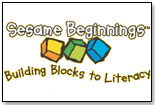 Sesame Workshop’s new innovative DVD series encourages learning through parent-child interactions. Based on research that shows that young children learn best when experiences are shared with a loved one, these DVDs are specially designed to help parents and caregivers encourage their child’s curiosity and interest in learning during everyday interactions. Featuring baby versions of the Sesame Street Muppets and their caregivers, “Sesame Beginnings” offers age-appropriate content while entertaining, engaging and encouraging interaction between caregivers and their children. The DVDs are supplemented by a printed guide, offering parents additional tips for ways to extend the learning after viewing through activities such as feeding, bath time and playtime. It's best for children aged 6 months to 2 years. 1/30/2006
Sesame Workshop’s new innovative DVD series encourages learning through parent-child interactions. Based on research that shows that young children learn best when experiences are shared with a loved one, these DVDs are specially designed to help parents and caregivers encourage their child’s curiosity and interest in learning during everyday interactions. Featuring baby versions of the Sesame Street Muppets and their caregivers, “Sesame Beginnings” offers age-appropriate content while entertaining, engaging and encouraging interaction between caregivers and their children. The DVDs are supplemented by a printed guide, offering parents additional tips for ways to extend the learning after viewing through activities such as feeding, bath time and playtime. It's best for children aged 6 months to 2 years. 1/30/2006
V.Smile Art Studio by VTECH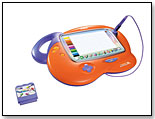 Parents can give boring paints and pens the brush off and add some dimension to their child’s designs with the V.Smile Art Studio. With this powerful electronic palette and pen, children can project their creations right onto the TV screen. The kit includes 12 art activities that allow kids to not only mix colors, create shapes and animate, but also to take drawing lessons. The Studio allows kids to save their work. It connects directly to the V.Smile TV Learning System to create virtual art on the TV screen. 1/30/2006 (MSRP: $29.99; Age: 5 to 7)
Parents can give boring paints and pens the brush off and add some dimension to their child’s designs with the V.Smile Art Studio. With this powerful electronic palette and pen, children can project their creations right onto the TV screen. The kit includes 12 art activities that allow kids to not only mix colors, create shapes and animate, but also to take drawing lessons. The Studio allows kids to save their work. It connects directly to the V.Smile TV Learning System to create virtual art on the TV screen. 1/30/2006 (MSRP: $29.99; Age: 5 to 7)
V.Smile Jammin' Gym Class by VTECH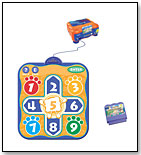 Parents can get their children’s legs jumping and hearts pumping with the V.Smile Jammin’ Gym Class. This high-energy toy is a jam, bam and slam with kids — and with parents who want to give their children a jump-start in sports. The soft, oversized exercise mat gives children room to zoom and connects easily to V.Smile for beginner and advanced level lessons in letters, numbers, colors, spelling, health and more. It’s never too early to encourage a healthy lifestyle with the V.Smile Jammin’ Gym Class. 1/30/2006 (Age: 4 and Up)
Parents can get their children’s legs jumping and hearts pumping with the V.Smile Jammin’ Gym Class. This high-energy toy is a jam, bam and slam with kids — and with parents who want to give their children a jump-start in sports. The soft, oversized exercise mat gives children room to zoom and connects easily to V.Smile for beginner and advanced level lessons in letters, numbers, colors, spelling, health and more. It’s never too early to encourage a healthy lifestyle with the V.Smile Jammin’ Gym Class. 1/30/2006 (Age: 4 and Up)
V.Smile TV Learning System by VTECH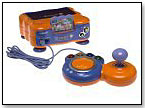
Parents can turn “Game Time into Brain Time” with the V.Smile TV Learning System, which combines a video game platform and educational content in a system that connects directly to the television. The system features 32 “smartridges,” with an additional ten in Spanish. This product is a 2007 National Parenting Center Seal of Approval Award and Creative Child Magazine Toy of the Year Award winner.
— Russell Selick, manager of Bob’s Toys in Seattle, was surprised at how good a showing the V.Smiles were having. “They sell, but now, come Christmas, it seems everyone wants one.”
— “It’s a 'grandparent' gift, a 'parent' gift, and when the kids get it, a ‘kids’ gift, too. Everyone likes them,” responded Betty Pagginette, owner of St. Louis’ Playful toy store.
— “Can’t keep them on the shelf,” a frenzied Douglas Robertson, co-owner of Robertson’s Toys in Ogden, Utah, said. 2/10/2005 (MSRP: $49.99; Age: 3 to 7)
Brainy Baby DVD - Laugh & Learn by BRAINY BABY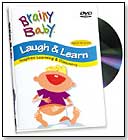 Young viewers will laugh at silly faces, “things that go,” matching games, music and much more, while learning critical skills such as problem solving, listening skills, classifying skills and concept awareness. The 45-minute DVD includes special features, including Scene Selections, Storybook, Baby Bloopers, Sneak Peeks, Behind the Scenes and Fun Learning Activities. 9/1/2004 (MSRP: $17.99; Age: 1 to 3)
Young viewers will laugh at silly faces, “things that go,” matching games, music and much more, while learning critical skills such as problem solving, listening skills, classifying skills and concept awareness. The 45-minute DVD includes special features, including Scene Selections, Storybook, Baby Bloopers, Sneak Peeks, Behind the Scenes and Fun Learning Activities. 9/1/2004 (MSRP: $17.99; Age: 1 to 3)
Copyright © 2026 TDmonthly®, a division of TOYDIRECTORY.com®,
Inc.